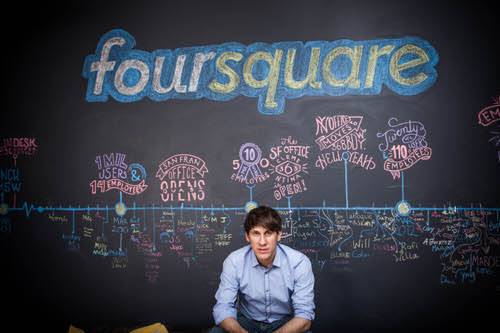
When Dennis Crowley launched Foursquare in March 2009, it was one of the first apps to tap into rich location data from smartphones. He introduced us to the idea of a check-in—a social gesture announcing one’s whereabout to a specific set of friends.
Now, five years and billions of check-ins later, he’s ripping his app in two, turning Foursquare into a city guide and introducing Swarm, a new app for finding friends nearby, whether or not they’ve checked in.
Swarm will be out by the time I sit down with Crowley for our next ReadWriteMix event on June 3. Taking place the same week as Apple’s Worldwide Developers Conference, this ReadWriteMix promises key insights on the future direction of mobile devices.
Reserve your seat: ReadWriteMix: Mapping The App Economy, June 3
Crowley hasn’t had an easy ride. Foursquare was hot until it was not. Even with some 50 million downloads, it faces ongoing questions about just how popular the core app is. (I plan to ask some of those.) But Crowley’s belief in the company’s long-term potential has been unwavering. And the company has finally gotten its various tools for making money in motion—six different lines of business, from location-based ads to data-licensing fees and more.
The Power Of Context
I’ve argued that to look at Foursquare purely as a consumer-facing social tool ignores the other ways in which it can become a vital part of the Internet. Its database of places, refined through check-in after check-in, is a four-dimensional map of both space and time, turning the pulsing movements of humans through cities into bits and bytes in a way other location players haven’t been able to do.
That in turn has made it an essential helpmate to other app creators, the go-to way to include location in mobile experiences as diverse as Uber, which uses it to pinpoint pick-up spots for riders, and Pinterest, which places its images on a map with Foursquare’s help.
There’s potential beyond smartphones, though: Wearable devices, to be useful, require knowledge of a user’s current location and habits—data Foursquare has in spades. With a smartwatch or fitness band, you can’t input a lot of information. The device just needs to know the right answer at the right time, whether it’s prompting you to grab coffee at a new spot on your way to work, or reminding you to work out if you fell short on your steps goal and you’re near the gym.
Crowley and I will have a lot to talk about. Please join us for what promises to be a rollicking, no-holds-barred conversation about all things social, local, and wearable.
Tickets to ReadWriteMix cost $15. All proceeds go to support Girls Who Code, whose programs work to inspire, educate, and equip girls with the computing skills to pursue 21st century opportunities.
Photo courtesy of Foursquare
















